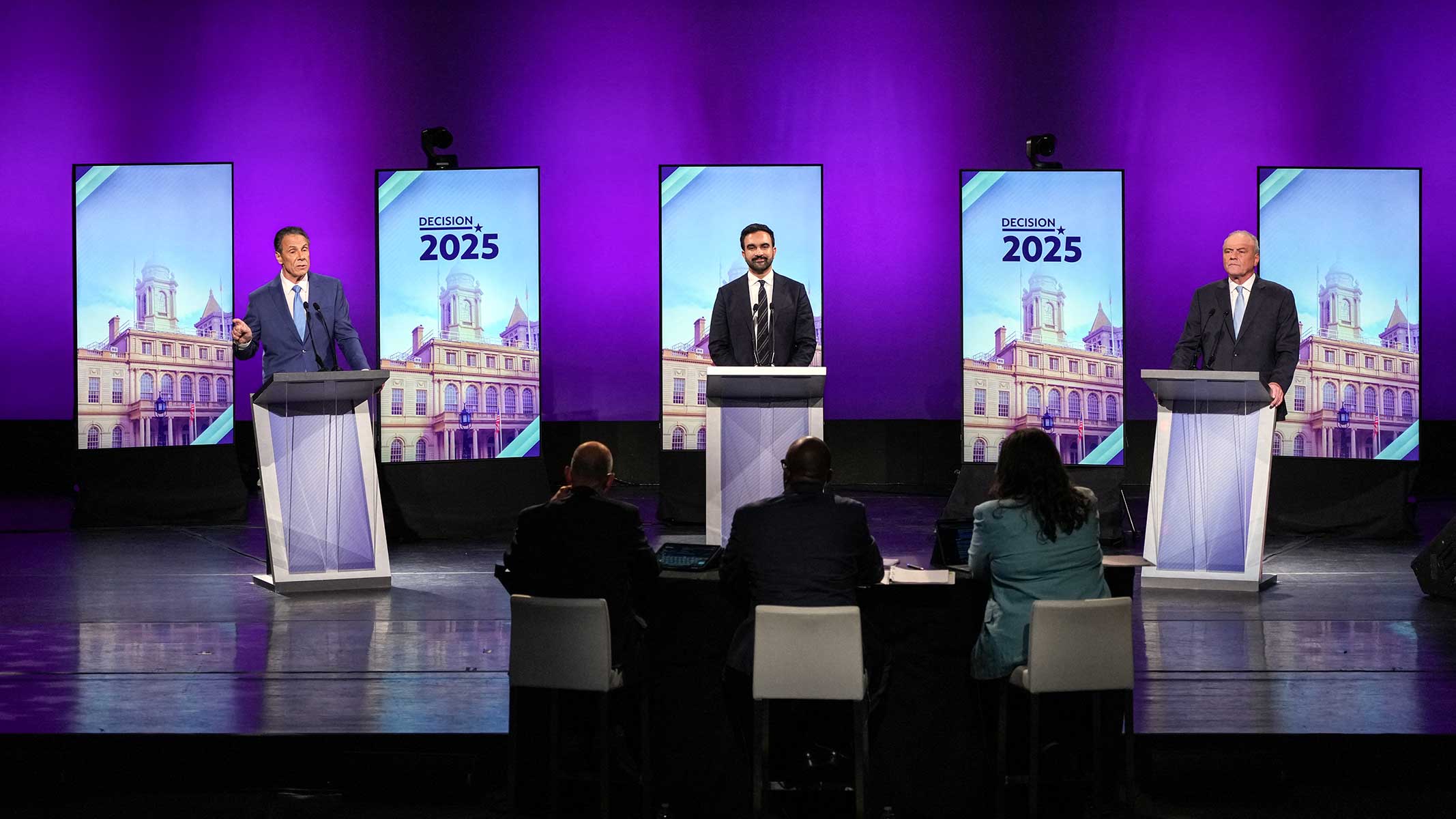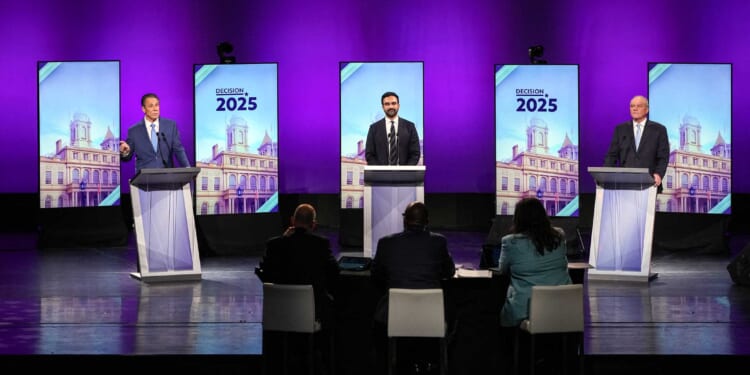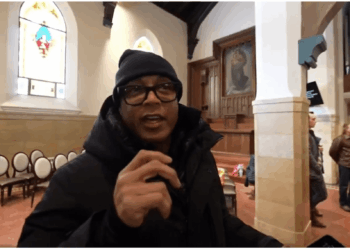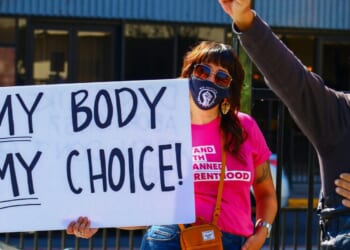
What did the final New York City mayoral debate reveal about the future of the race—and the city itself? Nicole Gelinas, John Ketcham, and Rafael Mangual break down the candidates’ best and worst moments, and what their performances signal for voters. They also dig into the biggest issues shaping public sentiment—from the crisis at Rikers Island and challenges in education policy to the fallout from recent ICE raids on Canal Street.
Finally, a reason to check your email.
Sign up for our free newsletter today.
Audio Transcript
Rafael Mangual: Hello, and welcome to another episode of the City Journal Podcast. I am your host, Rafael Mangual, and I am so happy to be joined by my brilliant colleagues. We’ve got John Ketcham and Nicole Gelinas, the great Nicole Gelinas. Welcome to the show.
John Ketcham: Thank you.
Rafael Mangual: So I want to just jump right in to the big news, which is the mayoral debate. Last night you had Zohran Mamdani, Andrew Cuomo and Curtis Sliwa finally waking up from the dead, it seemed, having it out on stage at LaGuardia Community College. What did you all make of the debate? What were some of the big moments that kind of caught your attention? John, we’ll start with you.
John Ketcham: So the biggest moment for me, I have an ear for policy, we’re in the business. I think it’s apparent to everyone that Zo and Momani has a thin veneer on his proposals. And that came through when he refused to answer on the three citywide ballot questions relating to housing development.
Rafael Mangual: It wasn’t so much a refusal as it was a very clear indication that he hadn’t even given it any thought. I don’t think he could have told you what the city ballot initiatives were, had he been asked to follow up on that.
John Ketcham: Right. And voters are going to start early voting on Saturday. They’re going to be asked to weigh in on these questions. And many debate viewers are going to see him as less prepared potentially than an ordinary voter. And these are pretty significant ballot questions. They have not received as much attention as the mayoral race, but it was an opportunity for him to take a stance backing up his affordable housing proposals, and they would complement some of what he is saying in terms of new development, public investments and so forth. But he just wouldn’t go there.
Rafael Mangual: No, it was a big swing and a miss. I definitely caught that. I mean, to me, it just looked like he was a deer in the headlights in that moment. It was a true, “oh, you know what” moment where, I mean, he just hadn’t given it any thought. And it was that blank stare I think was worth a thousand words. Nicole, what about you? What’d you think?
Nicole Gelinas: I think overall, the big thing that stood out to me was that Andrew Cuomo did much better than he did in the first debate a week ago. He seemed awake. Maybe that’s a low bar. He seemed engaged, alert. He seemed to be having a good time, which we haven’t seen that much from him over this campaign. Seems like a lot of times he’s kind of just walking through it. He seemed more relaxed, and getting some zingers across against Assemblymen Mamdani and Curtis Sliwa. I think most importantly, he finally figured out how to both respond to Sliwa’s jabs against him from one side and also land some jabs against Mamdani on the other, which last week he seemed really lost between the two. A couple of examples on the crime exchange. I thought Cuomo very effectively explained why and how Jessica Tisch is just going to have a very hard time working under Mamdani. And that two philosophies really do not meet very closely there. And he did that despite the fact that he still carries this bail reform and discovery form and everything else baggage. He seemed more willing to be a little bit assertive on that issue instead of on the defensive. And also on housing, I thought Cuomo’s answers on things like, can you really do a rent freeze? The mayor cannot just decree a rent freeze. I thought Cuomo gave a pretty good technocratic answer there, but also it made that point across to the public that this is not as easy as it seems.
Rafael Mangual: That was, I think those were the strongest moments for him in the debate where he was pointing out the barriers that Zohran Mamdani would have to surmount in order to enact as policy agenda. And I think once people start to understand the number of stars that have to align for him to do the things that he’s promising, it’s very, very unlikely that any of that is going to come to pass.
John Ketcham: But Mamdani now has had multiple opportunities to respond to whether the rent freeze would be legal.
Rafael Mangual: Right.
John Ketcham: In fact, I think the Manhattan Institute deserves some credit here because that theory first appeared in City Journal. That’s right. Christian Browne, an attorney who had worked in the Giuliani administration, raised the challenge that the mayor does not set rent-stabilized rent increases. That responsibility belongs to the Rent Guidelines Board, which is an independent body composed of mayoral appointees. Yes. But on a staggered board. So there’s a term of years that they serve and they cannot be fired except for cause. So the law contemplates an independence, and it also stipulates that the RGB members have to factor things like property tax increases, water, sewer rates, and owners operating costs. What Mamdani is essentially proposing is to put members on who will only agree to a 0 percent rent increase for four consecutive years. It amounts to a great pre-judgment of what should be an independent determination by the RGB.
Rafael Mangual: Argument. Essentially, what he should be doing is telling them to allow for the smallest possible increase without doing undue harm to landlords. But what he’s really saying is that it doesn’t really matter. He doesn’t care about any of that. He just wants them to zero it out, which is incredibly irresponsible. But I did think it was a telling moment where he just kind of came out and said, yeah, well, I get to appoint the members, right? I mean, so it’s just he’s going to use power and bulldoze his way to whatever he wants.
Nicole Gelinas: Ironically, something that Cuomo was often justifiably accused of doing. So you have Cuomo here explaining, oh no, you can’t just do that. Here’s how the process actually works. And I think in addition to the legal and constitutional issues, Cuomo also effectively said on the practical issue here, if you freeze the rent landlords or property owners will take more units off the market because they won’t be able to make a profit on those units. And so you are reducing the supply of affordable housing. Now, again, this is a conundrum of Andrew Cuomo. What he said was good. Knowledgeable voters also know he’s partly responsible for this. So this is both, this is the story of Cuomo throughout this campaign. You have to put aside some of what you know about him. But that’s politics. No one is coming up here with clean hands.
Rafael Mangual: Well, I’ve got a story on this that I think I’ve told you, John. But in 2019, toward the end of that year, my wife and I were moving to Queens in anticipation of our first kid being born. We found this great apartment in Kew Gardens that we loved and we wanted. It was under renovation, but it was going to be ready in about a month, which would’ve been fine. We told the realtor we’re going to go ahead and take it. And three days later, we didn’t have a lease. So we called him up and he was like, “Oh, I’m really sorry. But the landlord, because of this new law, has decided to stop all the renovations and the building is just going to take those apartments off the market and write the losses off.” I mean, we tried everything because we loved the apartment so much. It was in the perfect spot. It was right by the Long Island Railroad. “We’ll pay $500 more in rent.” “Well, no, he can’t do that. It’s rent-stabilized.” Okay, well, it came with a parking spot. I was like, “I’ll pay $1,500 a month for the parking spot.” They were like, “no, sorry. It’s just not worth it.” And that was a real impact in my life. And yeah, I absolutely remember that Cuomo was a part of that. Just the way I remember that he was a part of voter reform and discovery reform and raise the age, which came up yesterday as well, but as well as Cuomo did relative to his prior performances. It did seem to me like he has still not quite come to terms with the fact that his resume is not going to get him by in this race.
Nicole Gelinas: I just wish he would’ve said sometime during the campaign, a big difference between me and Mamdani is I’ve made all of my mistakes and demonstrate how he’s learned from these mistakes. I think some of the people who are more likely to vote for Sliwa because they’re aware of the bail reform and raise the age and discovery reform and the 2009 property protections loss, they might be willing to give Cuomo a chance if he would just say, look, I should not have done bail reform without the danger standard. I made a mistake and I’m learning from that mistake. But like many people, he has a hard time acknowledging that and moving past it. And I think it has hurt him a little.
John Ketcham: Something else I found curious that he didn’t acknowledge throughout most of the campaign at least, didn’t really become a big campaign issue, was the fact that he built a lot of impressive infrastructure in the Tappan Zee bridge.
Rafael Mangual: Well, he mentioned that yesterday.
Nicole Gelinas: Finally. He talked about it a lot.
John Ketcham: Finally, belatedly. Well, now the Mario Cuomo Bridge, of course, he rebuilt LaGuardia Airport. Yeah, he mentioned that too, is an amazing triumph. The old LaGuardia was truly dilapidated and unsuitable for New York City’s needs the new one. It’s in fact so advanced that Zohran Mamdani took a swipe at his ordering the fountain that has musical capabilities, and I think it delights many people when they come and they put it on Instagram and so forth. But he had the ability to be more, say, positive in his campaign messaging, saying, you know, I can rebuild New York City because we do need infrastructure. And I’ve done it. And it’s pretty uncommon to have anyone with that kind of capability. I’ve done it in the biggest projects in the state’s history. I can do it again. We’ll rebuild the Brooklyn Promenade, the triple cantilever, the BQE needs substantial rehabbing. This is not a job for someone who has zero experience in the actual governing of a city.
Rafael Mangual: I agree with that on substance, but I think that the audience’s eyes would’ve glazed over. And I think he’s realized that. And I think the proof is in the success that Zohran Mamdani has enjoyed because his campaign has been a mile wide and less than an inch deep. The reality is that the people who are making decisions, who are answering polls, who are driving the narratives, and these, they don’t care about the details apparently. Obviously, they don’t. They don’t care about experience. They care about someone who can say the right thing, who can sound good saying it and make people laugh and smile. And Zohran Mamdani checked those boxes. And again, it’s frustrating to some degree as someone who cares about policy, but it’s just the reality of our time.
Nicole Gelinas: Yeah, Mamdani last night seemed more nervous than usual. He talked faster than he usually talked. He didn’t smile as much. And it was striking just because there was really nothing for him to be more nervous about. I mean, no one really landed any critical points against him. And that, not that the criticisms of him are not substantive, but if they were going to land, they already would have. There’s no great new line to use against him, but he just seemed a little rattled. I wonder if he’s getting nervous as the reality of this hits him. And one place where Cuomo showed you need to understand infrastructure was with Rikers Island. I mean, Cuomo clearly…
Rafael Mangual: Yes. Your plan kind of came up.
Nicole Gelinas: Yeah. Like Cuomo said, you’ve got these four borough, he called them county jails, but you’ve got these four borough jails under contract. They’re way over budget. And Mamdani kind of tried to respond by saying, oh, you can cancel contracts that’ll cost money. Well, yes, it’ll cost money, but Cuomo effectively said, you want to cut your losses, even if that costs some money, and do something else and rebuild new jails on Rikers Island. And Cuomo also said you negotiate with the contractors. Like, the contractors…
Rafael Mangual: You can give them other projects. Exactly.
Nicole Gelinas: Need business in New York City again. Exactly. So they’re not going to nail the city to the wall on every last dollar that they’re owed.
Rafael Mangual: A couple of things here, one, there was an important moment in that because Zohran Mamdani never actually answered the question of what his plan was going to be when August, 2027 comes around and Rikers has to close by law and no jails will have been built. But for those of you who are watching and don’t know, Nicole wrote an amazing paper—was it two years ago now?—that laid out a plan to rebuild Rikers on Rikers Island? And so maybe you can just talk a little bit about that idea, because I do think that it’s caught on with the Cuomo campaign.
Nicole Gelinas: Yeah. I mean, it’s not that hard. You just take each jail facility on Rikers Island, rebuild a new facility, move to people into each new facility as you open it up. You can address many of the problems at Rikers Island without having to close down Rikers Island and move the jails to the four boroughs. The culture issue, this is more an issue with the corrections department, an issue of management, which isn’t…
Rafael Mangual: Change. I mean,
Nicole Gelinas: No, the things like people have to wait hours to get wanted before they go into the jail. That is a corrections work issue. It’s not going to be fixed by moving to jails, things like transportation to Rikers Island. You can have much better free Rikers dedicated bus service. Go to a few different stops within the city where most of your visitors are coming from and take them directly to the island and have the On Island bus also work much better because once the family members get to Rikers Island, they’re sitting there waiting for an hour just to take the corrections bus to the individual jail facility. I mean, that’s easily fixed. Environmental remediation. We’ve done this before. You just build up the landfill. You could do some other remediation as needed, but none of these problems are insurmountable. And I think Cuomo does realize that belatedly, but that’s better than nothing better than…
John Ketcham: And they’re all better than the alternative of building the borough jails, which are coming with a $16 billion price tag and significant…
Rafael Mangual: Assuming we don’t go over any more.
John Ketcham: And significant concerns from the people who live in those neighborhoods.
Rafael Mangual: And significant challenges just embedded in the fact that we’ve never done this before. There’s never been a high rise jail in a dense urban neighborhood. What happens if there’s a fire? What happens if there’s a carbon monoxide leak or a gas leak and you have to evacuate this place? What are the security? Are you just going to have people who are awaiting trial on murder one just filing out the door like it’s a high school fire drill? I mean, I don’t think the city’s really thought this through, but I do think that both Cuomo and Sliwa did a good job of highlighting the impending very dark reality, which is that, Hey, if August 2027 comes around and we don’t have anywhere to put these folks, we’re just going to release 7,000 inmates into the street. I mean, what’s that going to look like? And even if the four borough-based jails are built by then, which is not going to happen, thousand percent not going to happen. Their maximum capacity is still going to be about half of what the current jail population is now. So we’re just going to overnight decarcerate by 50 percent? I mean, we did that over the course of 10 years, and it probably helped boost the crime spike that we experienced in 2021, 2021, and 22. I don’t see how this isn’t a bigger issue.
Nicole Gelinas: And this is the second time. He also said it at the Vital City Forum a month or so ago. He has used that phrase, I will do everything in my power to make sure Rikers closes in two years again. And that gives him a lot of room that when you get to 27, he’s still blaming Adams and he’s still blaming De Blasio like, I wanted to do this, but I just couldn’t do it.
John Ketcham: And he was setting himself up for that by saying that Adams has put the city in the position of it being practically impossible.
Rafael Mangual: Right.
John Ketcham: So that’s given himself a mile.
Rafael Mangual: Even though when he was signing on to the DSA platform for decarceration back in 2019, one of the sort of core components of that document was that they opposed the building of the four new jails to replace Rikers Island. They just wanted to close Rikers Island, expand bail reform and zero out the jail population in New York City. No one seems to remember it. I remember it, but it is kind of annoying. But Nicole, you said something earlier that I think you’re completely right about, which is that Zohran seemed nervous. I definitely got that too. And I think one of the main indications was that his campaign leaked ahead of the debate that he was going to ask Jessica Tisch to stay on as the New York City Police Commissioner, which he confirmed on stage. And that’s interesting to me for a couple reasons. One is that what Andrew Cuomo said was, there’s so many incongruities between Zohran Mamdani’s stated policy positions now, his recent policy positions that he has kind of sort of disavowed, but not really, and what Jessica Tisch has done to bring safety back to New York City, I mean, her strategy has revolved around hotspots policing that’s intelligence-driven, that’s focused on gangs, that is critical of some of the infrastructure around criminal justice reform like bail and discovery and raise the age. And yet, Zohran Mamdani is pro-discovery reform, said on stage yesterday he wouldn’t do anything to change raise the age, has stood by bail reform, has come out against intelligence driven policing in mostly low-income minority neighborhoods where crime concentrates because he thinks that it’s racist. He’s come out in favor of abolishing the gang database, which Jessica Tisch says is absolutely critical to the work that they do. I mean, how does this work?
John Ketcham: Well, he could have it both ways. Maybe he could say, I’m going to keep Jessica Tisch on, but effectively create a hostile policy work environment and say, well, this is the new sheriff in town, and if you don’t like it, well, you always have the option. Then it’s on her to leave.
Rafael Mangual: Exactly.
John Ketcham: Yeah.
Nicole Gelinas: Even something like vending, she’s been better on trying to police illegal vending despite a lot of constraints on her. And when they asked the question about the federal raid on the Canal Street counterfeit vendors, Mamdani’s answer was just, well, we need more vending licenses. Well, we’re not, even if we have more vending licenses for food, we’re not going to…
Rafael Mangual: They’re never going to be licensed to sell counterfeit.
Nicole Gelinas: To sell them, license people to sell Louis Vuitton pocketbooks. So that answer doesn’t make any sense. And something like the policing of the e-bikes, she’s been giving out criminal summons to the e-bike drivers who are going the wrong way and riding on the sidewalk, because if you give them civil summonses because they don’t have a driver’s license, there’s no incentive for them to show up and pay the summons. I mean, how would he continue backing her up on giving criminal summonses to the e-bike drivers? I mean, he may very well repudiate all his positions, and that would not be a bad thing, but he just has to realize that that’s kind of what he’s setting himself up for.
Rafael Mangual: I think, John, I think you’re right about this. I think really what he’s trying to do is sort of save himself the political harm of saying he’s going to choose somebody else who’s more reform-minded, like a Rodney Harrison, for example, who for those of you who don’t know, is a former executive within the NYPD and then forced Jessica Tisch to leave, which kind of raises an interesting question, like what would happen if she preempted him now? And just said, well, I wouldn’t have said, I won’t say yes, and here’s why. I wonder what that would do for the electorate that Zohran Mamdani seems to be courting by making this choice. But I do think that it reveals some kind of nerves on his part. I think he, for whatever reason, is feeling some kind of pressure on this, which is a good thing.
John Ketcham: Ballot questions too. Why won’t he take a stand on these? And also mayoral control, what is that going to look like? So, for context, Mayor Bloomberg in 2002, won control over the city’s school system. So it used to be in dozens of decentralized districts, and Mayor Bloomberg thought that accountability was paramount and it should be centralized under the mayor’s direction and a single school chancellor. And so he got the law changed in Albany, and it’s been like that ever since. Subject to periodic renewals by the legislature. Mamdani opposes the continuation of mayoral control while also taking a stand that he believes in mayoral accountability. Well, the two are in great tension. I would say just shy of logically contradictory. The whole point of mayoral control is to establish mayoral accountability. The buck stops with him and the school’s chancellor, but he won’t go on the record to say what his educational vision would look like, what his DOE governance structure would look like, and how he would try to maintain the standards and the excellence that he lauded yesterday on the stage.
Rafael Mangual: No, I think that’s right. I think that’s right.
Nicole Gelinas: He just seems really uninterested in education. I mean, that always strikes me that he just doesn’t care. I thought that was another good point that Cuomo made, that you want to suddenly be the mayor of grocery stores, but you don’t want to do this job that the mayor already rightly has, which is run the school system. It’s just never, for whatever ideological reason, other than universal childcare, which is not education., he tries to talk as little about K through 12 or pre-K through 12 as he can. And then of course…
Rafael Mangual: Well, what’s he going to say? Right? I mean, other than whatever the teacher’s unions that support him want him to say,
Nicole Gelinas: And he wants CUNY to be free, but that’s another ideological thing.
Rafael Mangual: We tried this with CUNY, what, in the seventies, right? In seventies and eighties didn’t work out so great. The quality of the education went down, the dropout rate went through the roof.
John Ketcham: Turns out, skin in the game is important.
Rafael Mangual: Exactly. Right.
John Ketcham: And for the mayor too, to have a sense that no, we’re not going to let dozens of districts have their own say on the way that they’re going to educate children when that system was shown to breed corruption, inefficiency, and do a great disservice to New York’s children. And we spend 41 billion a year on this system. To be uninterested in that and instead be interested in creating five pilot grocery stores for a hundred million dollars.
Rafael Mangual: But to the extent that he has talked about education, it has been to push things that kind of reduce the emphasis on excellence. I mean, he’s come out against gifted and talented programs starting at an early age. For a while there he was against, and then flip flopped on the specialized high schools, which he’s a beneficiary of. So yeah, I think ultimately he’s not particularly interested in the city taking accountability for these results, in part because I think he understands that the results are not going to be very good. And it’s been a huge weak point of Brandon Johnson in Chicago, who I think he looks to as kind of an example of what a sort of democratic socialist mayor might look like in a big American city. And one of the biggest points of failure for Brandon Johnson in Chicago has been the poor performance of Chicago public schools. So to the extent that he can put distance between himself and that issue, it actually makes a little bit of sense.
John Ketcham: Hence, it’s part of the thesis here. Why is he so risk averse?
Rafael Mangual: Yeah.
John Ketcham: Is he getting nervous? Does he, in his campaign, do they know something that we don’t?
Rafael Mangual: I don’t know. I mean, it’s a little late for an October surprise.
John Ketcham: Two days away from early voting.
Rafael Mangual: I mean, there are a couple of things I want to talk about. Nicole, you mentioned the ICE raid, so I’m sure everyone who’s watching has heard. But a couple of days ago, day before yesterday, immigration and customs enforcement agents conducted a raid on Canal Street, which is infamous in New York City for being the site of a very large counterfeit goods market. So you have fake Louis Vuitton purses and fake Burberry scarves and illegal, I’m going to date myself now. I was going to say DVDs, but it used to be illegal DVDs and CDs and all kinds of illicit merchandise. Recently, there’s been something of an open air drug market where you have people selling pot on tabletops and who are not clearly licensed pot shops by New York State or New York City, and they made nine arrests. It was a pretty targeted operation. It wasn’t like a massive sweep. They didn’t arrest everybody on the street. They made nine arrests of people who were engaged in selling these counterfeit goods, all of whom were illegal aliens, who are likely now going to be deported, many of whom had significant criminal histories, including violent criminal histories. And people lost their minds. Protestors came out, the ICE agents were getting cursed out, having things thrown at them, being pushed and shouted at. And it was the first question in the debate yesterday, which struck me, because it seems like the outrage is about the enforcement of a law that everyone knows exists, right? It’s both against federal and state law to trade in trademarked counterfeit goods. And there’s good reason for that. The counterfeit, the trademark counterfeit market is an illicit market that funds all kinds of terrible activities. It’s a big revenue source for transnational gangs, for even terrorist organizations…
Nicole Gelinas: Human trafficking,
Rafael Mangual: Human trafficking. And for those of you who don’t understand, one of the reasons that criminals like trading in counterfeit goods is that they’re very cheap to make, especially when you consider that they’re made largely with slave labor overseas. They’re a lot easier to smuggle because they don’t have a particular scent. There’s no drug sniffing dog for fake Louis Vuitton. And to the extent that you get caught as a seller, enforcement trends over the years have been relatively lax. So you’re not looking at the same amount of time that you would look at if you were caught selling crack or fentanyl or something like that.
John Ketcham: They’re not paying sales tax or income taxes either.
Rafael Mangual: So it’s an incredibly profitable industry for a lot of transnational gangs and terrorist organizations to be involved. In fact, the ‘93 World Trade Center bombing, the Blind Sheikh financed that in part through the selling of counterfeit goods, at least according to an investigation that was done by Congress. So there is a really good reason to enforce the law here. And it seems like when the candidates got asked about this, they were either shocked that the federal government would ever do something like this, or appalled that someone could get in trouble for selling counterfeit goods. And it blew my mind. What were your reactions to that?
John Ketcham: It’s also a nuisance problem. And lots of New Yorkers, I think, don’t particularly like having this on the street.
Rafael Mangual: Oh, they absolutely don’t. I mean, there was an article in Spectrum News, by the way, which hosted the debate last night that was published, I want to say a month ago, where they cited a petition, an online petition that had garnered over 1500 signatures or something like that of area residents who were complaining and asking the NYPD to do something about the open-air counterfeit goods market on Canal Street, because it had ruined the quality of life. And that article had cited previous enforcement actions taken both by the NYPD and federal officials. There was literally nothing unprecedented about what happened a couple of days ago on Canal Street. And yet that word, unprecedented, was used to describe the operation.
John Ketcham: If the NYPD had enforced against illegal vending, it would certainly not have created the type of backlash that it did. It clearly was…
Rafael Mangual: Cause the Quality Life Division did do a raid. I want to say it was in March of this year?
John Ketcham: But infrequent, spotty at best, right? But the fact that it was ICE raised the salience dramatically,
Rafael Mangual: But ICE has, this is part of ICE’s jurisdictional remit.
Nicole Gelinas: It’s customs.
Rafael Mangual: Yeah, it’s a customs violation. So they are the primary enforcement agency at the federal level for the counterfeit goods problem. So they have a massive presence at ports where they are inspecting big shipping containers and regularly seizing millions and millions of dollars worth of trademarked counterfeit goods.
John Ketcham: Sure. Legally, that’s all exactly right. I’m saying that’s the reason why there was so much outrage and New Yorkers going up to these officers simply because they’re from ICE.
Rafael Mangual: I mean, it doesn’t help that you have Andrew Cuomo yesterday basically saying that they are outside of their jurisdiction and threatening to have used the NYPD to push them out. He’s going to start a standoff and have the NYPD start arresting ICE agents for doing things that they have obvious federal jurisdiction to do. It is a federal crime in Title 18 of the US code under section 2320 to trade in counterfeit goods. This is absolutely their jurisdiction.
Nicole Gelinas: And this is one of these cases, as with many things Trump, that if government does not competently enforce similar laws itself on the local and state level, people get so frustrated that they want the federal government to come in. I mean, it’s a provocation that you can’t walk on Canal Street, and it’s gotten progressively worse as we’ve pulled back on enforcing these laws over the past decade where you used to have some pocketbook vendors, but they were kind of into shadows. They were nervous, and now they’ve just taken over the entire sidewalk. They actually get mad at you sometimes if you’re trying to walk on the public sidewalk because you’re kind of in their way. You’re encroaching on their blanket. They’re fighting with each other over their own jurisdiction. There’s drug sales mixed in here as well. And this is a block away from the courthouses, the federal court, the state court, and the civil and criminal county courts. So this is a real provocation that the city allows this to go on within plain sight of everybody who commutes to the courthouse. You are putting up with day-to-day crime and disorder just to go to work at the courthouse, which is kind of ironic, and this is something that the city and state should have dealt with long ago. So if you don’t want the federal government coming in here, what are you going to do about it instead? No candidate except for Cuomo, who at least implied in saying, we don’t need ICE to enforce quality of life, kind of implied that we should be enforcing quality of life. But none of them had a very good answer on, okay, this is not acceptable. Here’s what I would do instead.
John Ketcham: It’s also a problem for people with disabilities.
Rafael Mangual: Yeah, I mean, try rolling a wheelchair down that street. It’s impossible. And Zohran Mamdani had a very strange answer to this question during the debate, which was that, well, what we really need to do is just move on some of these city council initiatives to essentially legalize street vending and lower the transaction costs of selling things on the street, which is so interesting to me for a couple of reasons. One is that it completely goes against the progressive history of being pro-regulation, right? I mean, this is essentially a libertarian policy proposal. It’s like, well, anybody should be able to sell whatever they want on the street, irrespective of whether they’re licensed by the city and no oversight, no fees. No. I mean, that is not the kind of progressive line that you would normally get.
John Ketcham: Private appropriation of public land for private benefits.
Rafael Mangual: Exactly. It’s exactly right. But on top of that, it also would do nothing to have stopped that raid, because again, the raid, the jurisdictional hook for the federal action was the fact that they were committing a federal crime, which you cannot repeal through a city council law.
Nicole Gelinas: Right, and he gave at the Vital City Forum, he gave a very similar answer when Errol Lewis from Spectrum asked Errol said he went to the West Indian Day parade, there were vendors selling illegal alcohol all over the place, including to minors. What are you going to do about selling illegal alcohol on the street? And Mom, Donny’s answer was the same. We need more vending licenses. Well, we’re not going to give people licenses to sell unregulated alcohol to minors. So I think this is an instance where it’s already kind of bad, so we can’t blame him, but the baseline could get much worse when he takes office. If the vendors realize this really is a free for all. Nobody is going to enforce this at all. A bad situation has potential to get much, much worse, including on Roosevelt Avenue.
Rafael Mangual: No, I think that’s right. I think that’s right. And Roosevelt Avenue is where you have a massive illicit market in prostitution that has really pissed off a lot of local residents there. I know a couple of people who live right off of Roosevelt Avenue in Elmhurst, and they are just absolutely mortified by the vagrancy and the just blatant violations of the law that are occurring along that sort of very main thoroughfare. I mean, it’s an artery through that neighborhood.
John Ketcham: Something else Mamdani has tried to distance himself from, he has stated that he does not, or has never supported the legalization of prostitution.
Rafael Mangual: But the decriminalization, which is kind of a distinction without a difference in some ways. But yeah, I mean, again, on stage yesterday, he says, no, we’re not going to arrest the people who are doing this. Which is, it’s like, okay, but I don’t think that what you’re inviting is going to be very good for the city of New York. Yeah, I mean, it was an interesting debate for sure. I think a lot of issues that people care about became a little bit clearer. But the question is, is that enough to really change what has been something of an inevitable end result for a couple of months now, at least, if not longer? So we’ll have to wait and see.
John Ketcham: Well, Curtis is in the race. He has bucked all attempts to get him to exit.
Rafael Mangual: Even to the point of quitting his very popular radio show yesterday live on the air. It was an incredible moment on, it was with Sid Rosenberg and basically said, I will never step foot in. I mean, he views it as kind of a betrayal by Sid, by John Catsimatidis, who runs the station also has a show to ask him to get out of the race.
Nicole Gelinas: Which is understandable. I completely agree or not agree, but I think it’s reasonable for people to try to persuade Curtis Sliwa voters to vote for Cuomo instead. But that is different from the pressure to get Curtis Sliwa to drop out of the race. I do think there are…
Rafael Mangual: Is it though? Because I mean, if he’s still in the race, then why still be in the race if you’re asking his voters to vote for Cuomo?
Nicole Gelinas: I think because there are implications to telling someone who won a major party ballot line he should drop out…
Rafael Mangual: In a city in which that major party has zero influence…
Nicole Gelinas: I mean, they’re sort of blaming Sliwa as the proxy for a lot of problems, including that nobody contested the line. If they had wanted to run a different and perhaps stronger on policy and biography, Republican candidate, the state and county Republican operations should have thought of that a year ago.
Rafael Mangual: I’m sure they did. But I also think that they had sort of come to the conclusion that it doesn’t matter who wins the Republican primary because New York is not in a place…
Nicole Gelinas: And suddenly it does.
John Ketcham: Well, they could have also put something of a placeholder weak candidate and use that leverage to extract concessions from Cuomo. To say, we’ll pull out, but you’ve got to agree to a compromise.
Rafael Mangual: But they would’ve had to have anticipated the situation that we’re in. I don’t think anybody anticipated that Zohran Mamdani was going to sail to victory with a very easy campaign. I mean, I remember reading pieces a few months ago in very reputable publications, basically saying that Zellnor Myrie and Zohran Mamdani were going to be confused from one another on ballots, and that neither of them would go anywhere because both of their first names started with Z. So yeah, I don’t think anyone really saw this coming. But I mean, it is interesting because Cuomo seems to be, not Cuomo, Sliwa seems to be resisting an enormous amount of pressure, not just from his friends, like Sid Rosenberg and John Catsimatidis, but also from very powerful New Yorkers like Bill Ackman, who’s kind of been going scorched earth to push on him so…
John Ketcham: Well, the polls were wrong during the primary by and large, or they at least didn’t capture Mamdani’s last minute surge. They could be wrong again this time. I mean, you have a couple of things that are happening. Mayor Adams just announced moments ago that he’s going to endorse Governor Cuomo.
Rafael Mangual: He’s going to be endorsing Cuomo, yeah.
John Ketcham: And they sat court side together at the Knicks opening game last night, flashing thumbs up signs. That’s one thing, maybe a modest bump, but maybe a meaningful bump, especially among black voters who are already predisposed to voting for Cuomo. And maybe the polls are not capturing the electorate as it will turn out on election day. We have an open letter by about 800 rabbis. Now, discussing the feeling of that was insecurity…
Rafael Mangual: Another powerful moment during the debate because it did seem like Errol Lewis was trying to minimize that by saying it was a few or several. And Cuomo was like, no, no, not several. At the time, it was like 680 or something.
Nicole Gelinas: And that’s a place where Cuomo finally landed a good line against Mamdani when Mamdani was waxing about how he’s going to create safe spaces against antisemitism. And Cuomo said you were going to be the savior of the Jewish people? I thought that was effective. He made that point without sounding too negative or dour, which is hard to do. If he had been doing that all along, it might’ve been a very different race by this point.
John Ketcham: And the why won’t you BDS Uganda, I thought it was pretty powerful too.
Rafael Mangual: Which he never answered.
John Ketcham: He never answered,
Rafael Mangual: Which he never answered. So for those of you who aren’t familiar with this exchange, Zohran Mamdani was photographed a couple weeks ago with one of the political leaders in Uganda, whose name…
John Ketcham: Rebecca Kadaga.
Rafael Mangual: Rebecca Kadaga.
John Ketcham: Deputy Prime Minister.
Rafael Mangual: Deputy Prime Minister, who has infamously led a campaign against homosexuality within the state of Uganda.
John Ketcham: And helped to lead the legislation for the Anti Homosexuality Act of 2014.
Rafael Mangual: Which criminalizes simply being gay, which is completely at odds with the tone and tenor and substance of Zohran Mamdani’s campaign. I mean, here he is doing videos with drag queens and promoting that on Twitter. So I mean, it was—X I should say—it was kind of interesting because Cuomo called him out and said, okay, well, hey, you say that we should boycott and divest and sanction these other states like Israel for doing things that violate human rights. Well, here’s something we all agree as a human rights violation. What does the human rights campaign exist to do except push on this issue? And yet he did not answer that question.
John Ketcham: He did not
Rafael Mangual: The only question that Cuomo got to ask him, by the way, because there was only one question allowed during that cross-examination section of the debate, and he didn’t answer it. I think everybody noticed.
John Ketcham: Agreed.
Rafael Mangual: So here’s our closer. Do you think the debate makes a difference in the outcome of this election?
John Ketcham: I think it does in the margins.
Rafael Mangual: Okay.
John Ketcham: And that matters because Mamdani wins with a majority. That feels a lot different than if he wins with a plurality.
Rafael Mangual: Interesting. Okay.
John Ketcham: Remember, a lot of his platform depends on cooperation with Albany. They’re going to look at these numbers and say, well, how much are we going to give him of what he’s asking for? If he wins with the majority, they’ve got to give him a good amount. If he wins with the plurality, they can pump the brakes a bit and say, we’ll give you something, but not everything, or at least a whole lot less. So…
Rafael Mangual: The governor is going to be under more pressure in the coming year with that election.
John Ketcham: Absolutely. But the polish of Mamdani’s rhetoric I think has come off a bit. People have seen and heard the same points over and over and now…
Rafael Mangual: Yeah, it seems like his answer to every policy question is spend money the city doesn’t have or enact some legislation he doesn’t have the power to enact.
John Ketcham: Right, right. But he says these things sort of in routine fashion, very polished and rhetorically effective. But on the fourth of two debates in the primary, two debates now in the general, it’s time to talk a little bit about the substance, and to the extent that he did it was either underwhelming or it was lacking. And so voters can see that.
Rafael Mangual: It’s not surprising. I think voters can also see the fact that outside of the debate, which is where they’re getting 15 second answers, 30 second answers, where it’s very easy to filibuster. Zohran Mamdani has not subjected himself to a real cross-examination by someone who is critical of his campaign. I mean, that used to be a tradition where major candidates and big, significant salient races would actually sit for an interview with someone that they knew was going to give them a hard time. I think voters deserve that. He’s not given it to them, and I don’t think he has any reason to now because it can only do him harm. But I do think that there are a lot of indications that he wouldn’t fare very well in that kind of interaction.
John Ketcham: Cuomo did take him to task on it. “You haven’t passed a single law on education or housing.”
Rafael Mangual: The things that he says are massive problems, and not just past, but has he even introduced a bill? Yeah. But again, in Mamdani’s defense on this point, I mean, neither has Andrew Cuomo sat for a similar kind of interview, but yeah. What about you, Nicole? What do you think? Do you think last night makes a difference?
Nicole Gelinas: I think to the extent that it makes a closer race, and I try to learn my lesson about not predicting election results, anything can happen, but if it is only a plurality and not a majority, I think Mamdani will have to be more mindful if he is rationally thinking about his own reelection, that a lot of people are worried about my approach, particularly on crime and disorder, and that if crime and disorder start to go up in the numbers and also in the perception that is going to put a lot of the rest of my agenda in peril because the governor is concerned about crime and disorder in New York City and for her own election, she may actually get away a little bit more on the fiscal stuff, but if it appears she is letting him let the city go to seed on crime and disorder, that will hurt her in a statewide race as well.
Rafael Mangual: Well. Yeah. I mean, especially now that she’s endorsed him, right? I mean, it may not have hurt her had she withheld her endorsement, then she could have blamed him.
Nicole Gelinas: Yeah. Things like the police backing up the mental health officers in the subways, I mean, that’s made a big difference. He wants to stop doing that. It’s explicitly in his plan and the co-response teams, which by the way, allow that…
Rafael Mangual: Because the co-response teams thing, I mean, it really kills me because this is a proposal that he just hammers every chance that he gets, and there is absolutely nothing behind it. He continues, and this is one of the things that I appreciated about Sliwa, is he continues to cite this program called Cahoots in Eugene, Oregon. First off, Eugene, Oregon and New York City. Very, very different places. I think Sliwa was right to point that out. But if you actually look into the cahoots program, they answer 17 percent of the calls that they could possibly answer for mental health, 75 percent of them are like the lowest risk kinds of interactions. It’s like giving a homeless person a ride to a shelter or just doing a welfare check. And even then in one, in every 67 calls that they respond to, they still call for police backup. And then in there’s some other subset of calls, police are already on the scene when they get there.
Combine that with the fact that there’s actually research. I mean, Zohran Mamdani said yesterday that he trusts dispatchers to be able to distinguish between calls that require police and calls. Well, there’s actually been a really good study done on this in Philadelphia, and you know what? The dispatchers there who have a lot more bandwidth than dispatchers here still got 20 percent of those wrong. Meaning that there was activity masquerading as some that requires a police response that ultimately didn’t, or vice versa, activity masquerading as an incident that didn’t require police response and then ultimately did. This is not easy.
John Ketcham: Any one of those 20 percent could wind up on the front page of the New York Post.
Rafael Mangual: That’s exactly right. And then on top of that, it’s like you want to expand this to answer 200,000 mental health calls a year? Where are you going to find that workforce? I mean, who told him that there is a ready stable of qualified mental health professionals that are going to work for a municipal salary and answer calls 24 hours a day, seven days a week to get vomited on and deal with crazy homeless people for $67, $80,000 a year if that.
Nicole Gelinas: It’s been an impediment to both the city and the MTA programs. It’s hard to find a nurse who wants to wander the subway all night. I mean, the people who do it, they do it because they really believe in it.
Rafael Mangual: Or they don’t have other options.
Nicole Gelinas: There are good jobs for nurses out there that are not cushy jobs, but they’re cushier than doing this thousand percent, that’s a constraint and that you can’t, I think he says he wants a hundred subway stations immediately that are only clinicians. Take away the police. If you did this right, ironically, you would need a bigger police force, not a smaller one, because you’d need more officers to back them up, but it would still take a long time. You cannot switch out to police for clinicians and continue to see crime falling even modestly.
John Ketcham: That’s exactly right. To my ear, he really wants a new order of nuns for that case.
Rafael Mangual: It’s wild. I mean, it really is. Anyway. Well, I appreciate the conversation as always.
Nicole Gelinas: Yeah, this was fun.
Rafael Mangual: It was. And for those of you who watching, I hope you enjoyed it as much as we all did. Please do not forget, like, comment, subscribe, ring the go, ask us questions, do all the things that help boost the podcast and the algorithm. I hope you enjoyed it. Until next time, you have been listening to the City Journal Podcast, we’ll see you again soon.
Photo by HIROKO MASUIKE/POOL/AFP via Getty Images
Source link


















